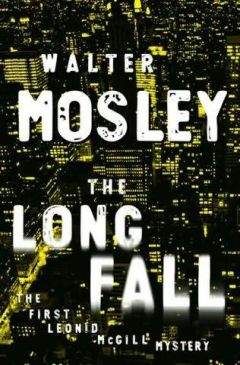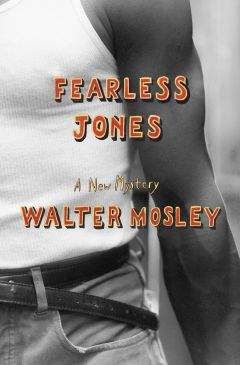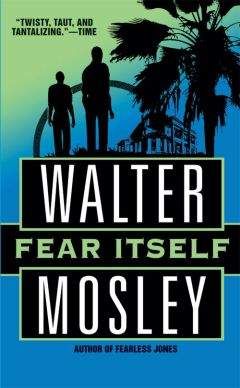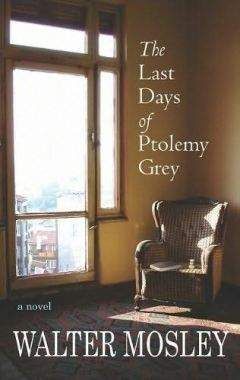Walter Mosley - The Long Fall
На электронном книжном портале my-library.info можно читать бесплатно книги онлайн без регистрации, в том числе Walter Mosley - The Long Fall. Жанр: Прочее издательство неизвестно, год 2004. В онлайн доступе вы получите полную версию книги с кратким содержанием для ознакомления, сможете читать аннотацию к книге (предисловие), увидеть рецензии тех, кто произведение уже прочитал и их экспертное мнение о прочитанном.
Кроме того, в библиотеке онлайн my-library.info вы найдете много новинок, которые заслуживают вашего внимания.

Walter Mosley - The Long Fall краткое содержание
The Long Fall читать онлайн бесплатно
I gave up my architectural conjectures and got down to the business at hand.
I was already wearing cotton gloves, had been since before I got out of my car.
There were two deep file drawers. But they were useless. Not in any kind of order, there were mostly printed forms, manuals, and things like tools and wires in the hanging folders. I went through everything, looking for some reference to the names I knew. No Frank Tork or Roger Brown, no Leonid Trotter McGill for that matter; nothing about the case, or any other job, that I could see.
The desk revealed little more than a pair of small shoes that sat under it. Norman Fell (aka Ambrose Thurman) didn’t keep information written down. There was no computer, or even a typewriter, in evidence. The only thing he had was a recent phone bill on the desk and a handwritten bookkeeping ledger in a locked bottom drawer. I tore out ledger sheets as far back as a month before Fell had gotten in touch with me, then pocketed them along with the phone bill.
“A MAN’S BOOKCASE will tell you everything you’ll ever need to know about him,” my father had told me more than once. “A business-man has business books and a dreamer has novels and books of poetry. Most women like reading about love, and a true revolutionary will have books about the minutiae of overthrowing the oppressor. A person with no books is inconsequential in a modern setting, but a peasant that reads is a prince in waiting.”
I don’t know where my father got all that stuff. He was raised just outside of Birmingham, Alabama, born to parents who could neither read nor write. He said that he became a revolutionary at the age of thirteen when his parents were being evicted from their sharecropper’s hovel and one of the white marshals spit on his mother. Soon after that he changed his name from Clarence to Tolstoy.
For all his humble beginnings my father was smart. But I think that even he would have been amazed at what Fell’s library had to say.
There were volumes in Greek and Spanish, English and French; old books of poetry shoved up right next to modern popular novels. Many had been shelved upside down and they covered every obscure subject under the sun. There was a Chinese tome that, from the illustrations, I assumed was about sewing machine repair. There were other manuals and textbooks along with sultry potboilers and children’s fairy tales.
In the end I “">Iultdecided that Fell must be functionally illiterate, though he loved the idea of reading and wanted to be seen as smart. That’s why there was no casework in his files, no computer, not one sentence anywhere written by his hand. I guess he knew his numbers well enough to write them down along with codes and simple names that he probably transcribed or worked out phonetically.
I’d have to come after Fell in a more straightforward fashion.
I would either wait in my car outside or stay where I was, seated behind his desk, to greet him when he showed up in the morning.
He wouldn’t want to call the police any more than I did. The problem was that he might be armed and shoot me where I sat. It was always better to come up behind your enemy. My father never told me that, but I learned it early.
Deciding on discretion over comfort, I went to the toilet to relieve myself before going back to the red SUV. I could sleep in the backseat and wake up with the sun. It had been a while since I had done anything like that.
Standing at the high commode, I sniffed at a sour tickle way back in my nasal passage.
I knew that tickle.
The man who had introduced himself to me as Ambrose Thurman was crushed into the bottom of the deep iron tub, eyes wide and lips drawn back over the small rounded teeth. The fingers of his left hand had all been broken—probably by a single blow. I couldn’t tell if he died from strangulation or the broken neck, but there was no question that he had died violently. He was wearing a dark-green suit with a checkered black-and-red vest. His socks bore holes at the big toe of either foot. I considered searching him but thought better of it.
I gazed into his face for a good long time before deciding he had nothing to say.
JIMMY WAS STILL on his stool when I got back to the Gray Wolf a few minutes before two. I returned the screwdriver and he set the elevator to take me to the fourth floor of the landlocked cruise ship.
I didn’t sleep that night, knowing for certain there’d be plenty time enough for rest when I was dead.
Ê€„
18
I got off on the seventy-second floor of the Tesla Building four minutes past eight o’clock the next morning. The leftover nervousness from the flight was nothing compared to the growing possibility of spending a couple of decades behind bars. Men were dying and all I had gotten out of it was a paltry wad of cash.
I found the seven locks that secured the outer office undone and the door ajar. I hovered in the hall a full thirty seconds, wondering if I should turn around and run to Brazil. I had one offshore account that was inviolable, and Twill could secret himself, and his mother if she wanted to come, down to Mexico for a rendezvous . . .
It was the thought of Twill that anchored me that morning. I had to stay around long enough to save him from his own nature.
The locks weren’t broken so I pushed the door and walked in quickly.
Carson Kitteridge stood up from one of the golden chairs usually inhabited by phantoms visiting my non-existent secretary.
“Lieutenant,” I said.
The cop smiled but there was no mirth in his eye.
In his late forties, Kitteridge was short and balding, slim and very white—pale. His eyes were gray, as was his suit and machine-washable tie.
“LT,” he replied.
We’d known each other nearly twenty years and not once had we shaken hands.
“How can I help you?” I said, refusing to ask how he got in.
“Just stopping by.”
“What? You were investigating some kinda buggery on the fifty-fifth floor and said, ‘Hey, why don’t I drop in on old Leonid?’” By this time I was entering the combination to my inner door.
“Something like that,” he said.
We walked down the aisle of empty cubicles that led to my office.
“Why you got such a big place?” Carson asked as we went. “You never had anybody work for you in all these years.”
“It’s my imagination,” I said, moving behind the desk.
“What is?”
“My imagination,” I said again. “It fills up all these rooms. It’s the only way I can think.”
“Fatheaded, huh?”
Sometimes the policeman and I could go on like that for half an hour or more. We kidded each other to hide our hands. In reality I didn’t like him and he cared even less for me. But we were stuck with each other like coworkers on an assembly line. I’d punch out a hole in an iron plate and he’d sand down the edges, complaining that he had to work at all.
I don’t know how the NYPD works exactly, maybe nobody really does, but Kitteridge was on a list that got lit up every time the cops got a whiff of me. Usually when he appeared my name had been whispered and a few dollars had changed hands, or maybe a surveillance tape had caught my profile coming out of some bad guy’s lair. We hadn’t seen each other much since I’d been trying to straighten out, but once every few months or so he’d drop by just to let me know that I was still on their radar.
›t="g t
For him to show up so soon after Frank Tork and Norman Fell had been murdered could not be a coincidence.
“I got work to do, Detective,” I said, unable to continue our banter. “What is it you want?”
“Can you fix the Lotto?”
With all the bile between us, Carson Kitteridge could still make me laugh.
“Naw, man. But I could score you enough crank to make you feel like you won it.”
His grin downgraded into a smile, and then that was gone.
“I don’t believe in coincidence, LT,” he said, echoing my own thoughts.
“Neither me.” I was hoping that he had gotten word on me going to visit Tork in jail. I was willing to give up Fell’s pseudonym. But if they had something on me up in Albany, things might get close.
The policeman sat back in the blue and chrome visitor’s chair. He put his elbows on the arms and laced his fingers. His gray eyes were like a hazy afternoon sky, they were so light and distant.
“You remember me once asking you if you knew a fella named Arnold DuBois?” he asked.
Fear blossomed in my lungs.
“No.”
“You remember. There was that guy, Timmons I think his name was. Second-story man, lived across the street from a jewelry store got burglarized. We found some of the ice in his freezer. But the robbery division was sure it was some other guy. Pete the Finn. You remember. This DuBois guy was in Timmons’s building just the day before the tip came down. Said he was looking for clients.”
“I don’t remember,” I said calmly, hollering inside.
“I understand. That was seven years ago. We’d just started the criminal keyword database at that time. Thank God for Homeland Security.
“The doorman gave us a description that fit you to a T, LT. But we couldn’t tie you to the Finn, and Pete’s lawyer kept him out of court, so we had no excuse to bring you in. Even if it was you, that didn’t make any direct connection to the robbery.”
I should have had a pithy comeback. That was our shtick. But I was no longer the man he’d hounded. And all I could think about was what his visit meant.
“Why are you here, Lieutenant?”
Kitteridge’s eyes tightened. I’d never been curt with him on an exploratory visit. We had our roles to play and for the first time in nineteen years I was stepping out of character.
“Camilla Jones,” he said. It was almost a question.
“Who?”
“Roger Brown’s fiancée. He was supposed to meet her night before last at a club on Fifty-seventh. When he didn’t show she called him and he said that he was sick. She thought he sounded nervous but he said no. He didn’t call her all the next day and so last night she went to his apartment and rang his buzzer. Nobody answered. She had the key, decided to use it, and found him dead on the floor. Strangled and beaten like a dog.”
“So?” I whispered.
“So a few days ago the elusive Arnold DuBois left his card at Brown’s office.”
“So?”
“The next day some big white guy came there, looking for Roger. The receptionist, a Juliet Stilman, said that he threatened her. When Roger heard about the guy he begged her not to call the police and snuck out through a side door. He didn’t come to work the next day, and now he’s dead.”
I waited a few moments before asking, “Is that all, Officer?”
“Are you going to tell me what you were doing there?”
I shrugged and made a meaningless gesture with my hands. “Freedom of speech also lets me keep my mouth shut.”
Kitteridge’s furrowed brow darkened his light-gray eyes. He sat forward in the chair.
“It’s said around certain circles that you’ve changed jobs,” he said, suggesting something.
“Soda jerk?”
“Point man for the killer—Hush.”
Of all the things I could be blamed for, murder for hire was one of the few not on the list. I knew Hush. We were friends as far as friendship was possible for either of us, but he’d given up the assassination trade, and I had never been involved in his business.
The idea that I could be a button man brought laughter from deep down somewhere. If I wasn’t sitting at a desk I would have doubled over in dark mirth.
This reaction enraged Kitteridge. He leaped up from the chair and for a moment I thought he might attack me. But the detective took on the role of policeman in a complete and ideal way. He didn’t batter prisoners or produce false evidence. He hated me and mine for not being like him but would never cross his own line.
He turned away and stalked out of my office. I didn’t need to check on his exit like I had with The Suit. I doubt if I could have risen from my chair anyway.
Roger Brown’s death weighed on me.
I wanted to do something but there was nothing left. Fell was dead, and Frank and Roger, too. Each one of them was like a nail through my flesh, pinning me down in that chair.
“It’s the housewives and plumbers,” my father had told me and my brother, Nikita, “the law-abiding and pious, that allow the most heinous crimes to continue. They raise their children and pray to God, while soldiers slaughter dark-skinned families in their country’s name.”
I wished my father were standing there before me right then. If he was, I could rise to my feet and slap his face. I’d tell him that his lessons put Nikita in prison and nailed me to that chair, wishing that I had become a plumber voting the Republican ticket and saluting the Stars and Stripes.
Ê€„
19
The online version of the New York Times had a picture of Roger Brown on the first page of the metro section: a dark and handsome face with doubting eyes. The scar on his right cheekbone reminded me of my handsome son. Roger’s smile was of the unconscious variety, the kind of grin that makes a woman think he’d be attentive, if a little mischievous.
Roger had lived in a good building in the West Village, where murders rarely happened, so there was a splash of sorts. The journalist questioned neighbors and they all testified to how shocked they were.
“He was a nice man,” Doris Diederrot, who lived on the fifth floor, said, “always helpful and friendly.”
“I saw him coming home from the Gristedes just yesterday,” Bob Hahn, the super, said. “He was a very nice, very courteous young man.”
Fear filled the streets of the Village, if you were to believe the copy.
Somewhere around eleven o’clock, two nights before, someone had broken the lock on the front door of the building. There was no nighttime doorman. The assailant or assailants went to the sixth-floor apartment, probably knocked, gained entry, and then beat and strangled the thirty-four-year-old investment advisor to death. No one heard anything. No one saw the attackers leave the building.
Похожие книги на "The Long Fall", Walter Mosley
Walter Mosley читать все книги автора по порядку
Walter Mosley - все книги автора в одном месте читать по порядку полные версии на сайте онлайн библиотеки My-Library.Info.



